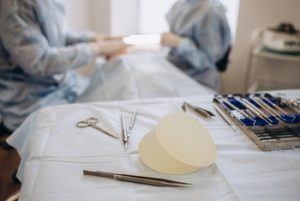
How to Check for Breast Cancer with Implants: What Every Woman Should Know
2025-06-19Contents
- 1 Why Breast Cancer Checks Matter Even with Implants
- 2 Do Breast Implants Increase the Risk of Breast Cancer?
- 3 How to Perform a Breast Self-Exam with Implants
- 4 What to Look For During a Breast Self-Exam
- 5 What Is BIA-ALCL and Should You Be Worried?
- 6 Breast Imaging and Screening with Implants
- 7 Talking to Your Doctor About Breast Cancer Screening
- 8 What Happens If Something Suspicious Is Found?
- 9 Final Thoughts: Stay Aware, Stay Empowered
For women with breast implants, knowing how to check for breast cancer can be a little more complicated, but it’s not impossible. Breast implants can slightly change the feel and structure of your breasts, which means that both self-exams and medical imaging may require a different approach. Whether your implants are saline or silicone, placed under or over the muscle, this guide will walk you through how to stay on top of your breast health with warmth, clarity, and confidence.
Let’s explore how to check for breast cancer with implants and what you should know to protect your health.
Why Breast Cancer Checks Matter Even with Implants
Breast cancer is one of the most common cancers affecting women today. Having breast implants, whether for cosmetic reasons or after a mastectomy, does not eliminate your cancer risk. In fact, in rare cases, a type of cancer called breast implant-associated anaplastic large cell lymphoma (BIA-ALCL) may develop in the scar tissue (capsule) that forms around the implant. While this is a rare form of cancer, it’s important to stay informed and vigilant.
Do Breast Implants Increase the Risk of Breast Cancer?
 Most studies show that breast implants do not increase the risk of traditional breast cancer, but they can make detection a bit trickier. That’s because implants—especially when placed in front of the chest wall—can obscure some of the breast tissue on a standard mammogram. Some women may also develop capsular contracture, a condition in which the scar tissue around the implant hardens, making self-exams more difficult.
Most studies show that breast implants do not increase the risk of traditional breast cancer, but they can make detection a bit trickier. That’s because implants—especially when placed in front of the chest wall—can obscure some of the breast tissue on a standard mammogram. Some women may also develop capsular contracture, a condition in which the scar tissue around the implant hardens, making self-exams more difficult.
How to Perform a Breast Self-Exam with Implants
Doing a monthly self-exam is one of the simplest things you can do for early breast cancer detection. If you have implants, here’s how to adjust your technique.
Step 1: Know what’s normal for you
Every woman’s breasts are different. If you’ve had breast augmentation, your breast shape and texture may have changed. It’s important to get familiar with how your natural breast tissue and implant area feel now so that you can notice anything unusual later.
Step 2: Use both visual and physical checks
- Look in the mirror with your arms at your sides and then raised. Watch for changes in skin texture, dimpling, or nipples turning inward.
- Feel your breasts while lying down and again while standing in the shower. Use the pads of your fingers in a circular motion, covering all areas of one or both breasts.
Step 3: Press firmly, but gently
You may need to press firmly to feel the tissue around and beneath the implant, especially toward the chest wall. Be sure to feel around the sides and underarms as well.
What to Look For During a Breast Self-Exam
With saline implants or silicone implants, you should look out for:
- A new lump or mass
- Swelling or pain in the breast
- Changes in skin texture, like dimpling or thickening
- Unexplained redness or rash
- Changes in nipple discharge or appearance
- Hardening or shifting of the implant (which may indicate implant rupture or capsular contracture)
These symptoms do not always mean cancer, but they do warrant a conversation with your doctor.
What Is BIA-ALCL and Should You Be Worried?
Breast implant-associated anaplastic large cell lymphoma (BIA-ALCL) is not a breast cancer but rather a rare type of immune system cancer. It develops in the fluid or scar tissue around the implant, most commonly in textured implants. The symptoms may include:
- Persistent swelling
- A mass near the implant
- Pain or tightness in the breast
Most cases occur years after implant surgery, and early detection usually leads to a full recovery with implant removal and treatment.
Breast Imaging and Screening with Implants
If you have implants, regular screening mammograms are still essential, but the process is slightly different. Tell your imaging center beforehand so they can schedule a mammogram technologist experienced in implant views.
What are Implant Displacement Views?
Also known as “Eklund views,” implant displacement involves gently pushing the implant back against the chest wall, allowing more of the natural breast tissue to be visible. This helps improve the accuracy of breast cancer detection.
Other Imaging Options
If you have dense breast tissue or your implants obscure the mammogram, your doctor may recommend additional screening, like:
- Ultrasound to view areasthat the mammogram can’t clearly show
- MRI for high-risk patients or those with implant rupture concerns
Talking to Your Doctor About Breast Cancer Screening
Your doctor is your partner in navigating breast disease prevention. If you have concerns about your implants, cancer risk, or are unsure how to perform self-exams, make an appointment. You should also discuss how often you should be screened based on:
- Your age
- Family history
- Implant type (smooth vs. textured)
- Any prior cosmetic surgery or radiation therapy
- History of breast augmentation or mastectomy
What Happens If Something Suspicious Is Found?



- A biopsy to remove a small tissue sample for testing
- Further imaging, like MRI or ultrasound
- In rare cases, removal of the implant is required if a cancer like BIA-ALCL is confirmed
Early detection gives you the best chance at successful treatment and maintaining your overall health.
Final Thoughts: Stay Aware, Stay Empowered
Checking for breast cancer with implants takes a little extra attention, but it’s entirely possible and essential. With monthly breast self-exams, annual screenings, and open conversations with your healthcare team, you can stay ahead of any concerns. Most women with implants never face serious complications, but knowing your body and your risks can make all the difference.
If you notice changes or have questions about your breast implants or overall breast health, don’t wait. Reach out to your doctor and schedule a check-up. Your well-being is worth it.
References:
https://www.cancer.org/cancer/types/breast-cancer/screening-tests-and-early-detection/mammograms/mammograms-for-women-with-breast-implants.html
https://www.mayoclinic.org/healthy-lifestyle/womens-health/expert-answers/breast-implants-and-cancer/faq-20057774
https://www.health.com/condition/breast-cancer/breast-implants-cancer-screening

